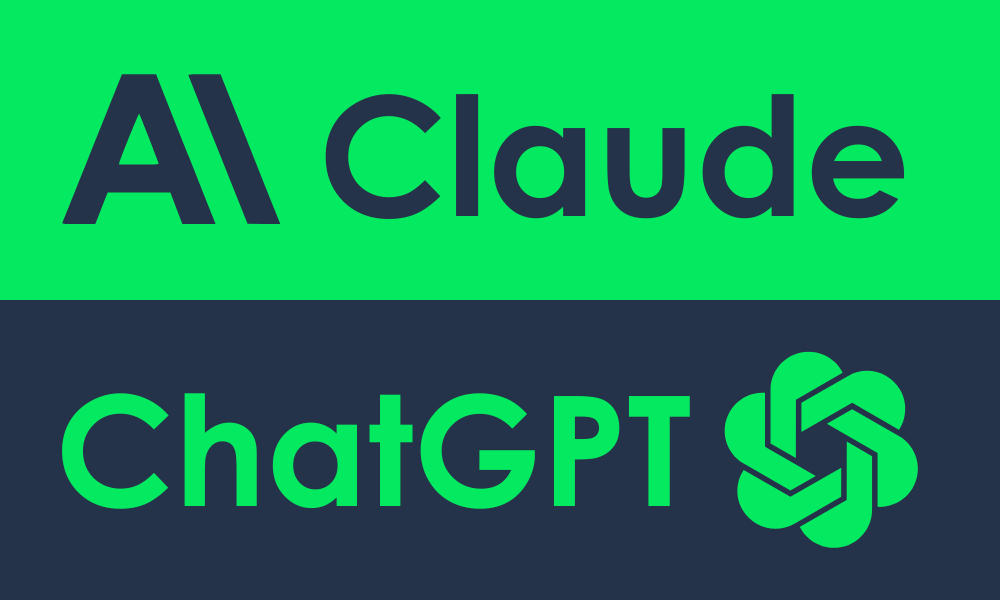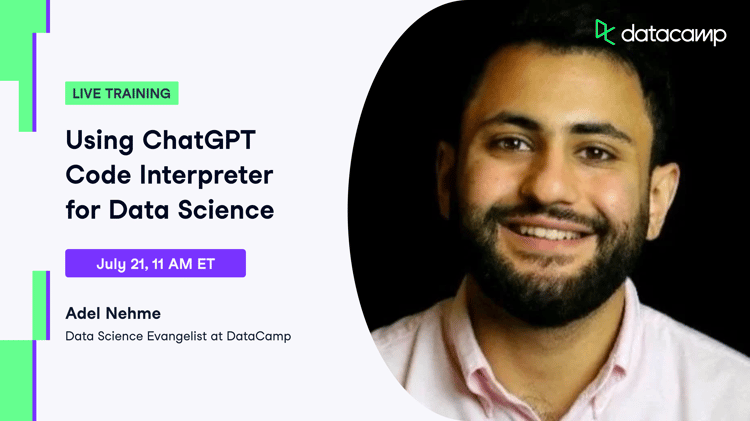Course
We live in a time of revolutionary technological progress, with many companies now beginning to integrate new generative AI technologies into the workplace. Data scientists and analysts have been using these technologies to improve productivity and the quality of their work.
Before ChatGPT, data scientists and analysts used GitHub Copilot to assist with coding tasks like optimization, formatting, debugging, and writing test units. However, ChatGPT has changed the game, enabling users to apply generative AI to almost every data science task, from data cleaning to model development and monitoring.
Expand your knowledge of GPT models, specifically GPT-4, by reading our article What is GPT-4 and Why Does it Matter?
Since the release of ChatGPT and Claude, we've witnessed rapid advancements in open-source and commercial AI systems. This article compares Claude—a state-of-the-art model from Anthropic—and OpenAI’s ChatGPT, focusing on their use in data science tasks.
If you're interested, there are 12 open-source alternatives to ChatGPT that you can explore to build your very own AI Chatbot. You can also find out how the new DataCamp AI assistant works in a separate article.

Image by Author
What is Claude?
Claude, developed by Anthropic, is a large language model (LLM) AI designed to generate text, write code, and function as an intelligent automated assistant, much like ChatGPT.
Anthropic’s unique “Constitutional AI” technique ensures Claude is aligned with human values and goals from its inception.

Claude user interface (using Claude 3.5 Sonnet model). Image by author
How to Access Claude in 2024?
Claude's availability has expanded significantly since its initial launch, and you can now access Claude through multiple interfaces:
- Claude.ai: Log in directly at Claude.ai to chat with Claude.
- Claude App for iOS and Android: Download the Claude app for iOS or Android to interact with Claude on your mobile device.
- Claude App for Slack: Add the Claude app to your Slack workspace to integrate Claude into your team’s communication and collaboration.
- Anthropic Console & API: Developers and businesses can access Claude through the Anthropic Console or via API, allowing for deeper integration and customization in various applications.
Please note that currently, you must be in one of Claude’s supported locations to access these services. For the latest information on supported locations and access details, visit Claude.ai.
What is ChatGPT?
ChatGPT is an AI-powered conversational platform developed by OpenAI. It utilizes large language models like GPT-4, GPT-4o, and GPT-4o mini to enable human-like conversations through natural language prompts. For more information, read our full guide, What is ChatGPT?
The chatbot is capable of generating code, translating text from one language to another, summarizing lengthy passages, correctly understanding the context within conversations, and performing various complex tasks.

ChatGPT user interface (using GPT-4o model). Image by author
How to Access ChatGPT in 2024?
Access ChatGPT by creating a free account at OpenAI.com. The free account should provide access to the latest models with certain limits. For an enhanced experience, consider subscribing to ChatGPT Plus, which unlocks early access to new features, data analysis, file uploads, vision and web browsing, DALL·E image generation, and more. They also offer Team and Enterprise plans with even more capabilities.
You can also access OpenAI's models through the API.
Comparing the Capabilities of Claude and ChatGPT
Let’s compare the two AI chatbots, Claude and ChatGPT, based on example prompts for data science tasks, including project planning, programming, data analysis, machine learning, time series, and natural language processing.
Note: it is not a comprehensive evaluation, as we use a single prompt example to determine which AI model provides better output for the specific tasks.
Before comparing the results in detail, let's review the comparison table to identify the key differences between Claude and ChatGPT.
|
ChatGPT |
Claude |
|
|
Parent Company |
OpenAI |
Anthropic |
|
Backed by |
Microsoft |
|
|
Launched on |
30th November 2022 |
14th March 2023 |
|
Number of users |
150 million + |
Private; not yet launched to the public |
|
Technology used |
GPT-4 and its variants (2024) |
Claude 3 and its variants (2024) |
|
Calculations |
Advanced |
Good |
|
Mathematical reasoning |
Poor |
Poor |
|
Writing ability |
Creative |
Natural |
|
Code generation |
Strong |
Optimized |
|
Text summarization |
Good |
Superior |
|
Data analysis |
Comprehensive |
Optimized |
|
Machine learning |
Basic |
Advanced |
|
Time series |
Good |
Excellent |
|
Natural language processing |
Improved |
Highly accurate |
Table by Author
Now, we will compare the performance of the GPT-4o model against the Claude-3.5 Sonnet model in detail.
Planning
Problem: In the prompt, we included a dataset description and project goal for building a loan classifier model. Those interested in accessing the dataset and project planning can find them in A Guide to Using ChatGPT for Data Science Projects.
Verdict: Both are great at project planning, but ChatGPT is slightly better at presenting the information and additional steps.
Programming
Problem: We asked both models to optimize a nested Python loop example.
Verdict: While ChatGPT attempted to optimize the code by storing values in a list, Claude could convert the nested loops into list comprehension, resulting in faster execution. Therefore, Claude emerged as the winner.
Data Analysis
Problem: We tasked both models with conducting exploratory data analysis on a loan classification dataset.
Verdict: Although ChatGPT demonstrated strong skills in data analysis, Claude's proficiency in writing efficient Python code ultimately gave it the edge. While ChatGPT employed a variety of libraries for data analysis, Claude relied solely on the pandas library for data visualization, processing, and analysis, showcasing their mastery of this tool. As a result, Claude emerged as the clear winner.
Machine Learning
Problem: We asked both models to perform detailed model evaluations using cross-validation and assess performance metrics such as accuracy, precision, recall, and F1 score.
Verdict: Claude outperformed ChatGPT in this regard by employing cross-validation for label prediction and subsequently utilizing various metrics to gauge model performance. In contrast, ChatGPT relied on cv_scores and a separate model to determine classification metrics.
Time Series
Problem: We presented a data description and tasked both models with building a machine learning model for predicting stock prices.
Verdict: Claude demonstrated a better understanding of the task while ChatGPT continuously asked follow-up questions. However, both models excelled at generating code, with ChatGPT resorting to an outdated method using from statsmodels.tsa.arima.model import ARIMA, while Claude implemented a more advanced approach using GradientBoostingRegressor. Claude was a winner in this case.
Natural Language Processing
Problem: We asked both models to write a Python code for fine-tuning the GPT-2 model on a new dataset.
Verdict: ChatGPT seemed to have hallucinated and created a new library for fine-tuning the model that didn't exist. On the other hand, Claude used a transformer library and successfully fine-tuned the model. Therefore, Claude wins this round.
Take a look at the comparison between Bard and ChatGPT for Data Science to understand how Google Bard measures up against ChatGPT in various data science assignments.
Claude vs ChatGPT: The Final Verdict
Claude is the recommended choice for data-related tasks that require a deep understanding of the technical context and the ability to generate optimized code. However, ChatGPT is the preferred option for all other tasks, especially with its advanced GPT-4 model.
Practical Applications of Claude and ChatGPT in Data Science
Claude and ChatGPT can provide valuable assistance in various data science tasks, such as:
Extensive project planning
Both tools can assist you in developing a comprehensive project plan. They can also provide insights, methodologies, and tools to help you prepare for the data science project.
Research
You can learn new concepts, languages, and frameworks with generative AI. Moreover, they can help you gather information, summarize research papers, and generate content.
Code generation
Both Claude and ChatGPT can generate code snippets for data preprocessing, feature engineering, model training, and evaluation, saving data scientists time and effort.
Unit testing
You can also automatically generate test cases based on the code and specifications provided.
Debugging
Each tool can provide suggestions and insights into potential errors or issues in code or data pipelines, allowing you to spot mistakes and learn how and why they’re impacting your code.
Reporting
ChatGPT and Claude can understand data analysis results and help you generate analytical data reports demonstrating your findings.
Optimization
You can optimize Python, SQL, and R code using these tools and also use them to recommend efficient algorithms or techniques to improve your code.
Performing statistical tests
You can generate statistical tests, such as hypothesis testing, ANOVA, t-tests, and regression analysis, based on the provided data and research questions.
Understanding data analysis results
Both AI tools can interpret your results, providing explanations, insights, and recommendations based on statistical findings and visualizations. This can help you understand your findings better and also help explain them to others.
Automating data science tasks
With the help of plugins, you can automate data analysis and various other tasks in data science workflow.
To learn how to use ChatGPT for building end-to-end machine learning projects, check out the Guide to Using ChatGPT For Data Science Projects.
Conclusion
ChatGPT and Claude excel at solving problems and generating high-quality code for data science projects. However, when comparing Claude by Anthropic with ChatGPT on various data science tasks, we found that Claude offers comparable or even superior performance to ChatGPT in specific tasks.
If you want to enhance your prompting skills, consider referring to our ChatGPT Cheat Sheet for Data Science and take our course, Introduction to ChatGPT, which covers prompt engineering.
Your Introduction to ChatGPT
FAQs
What are the key differences between Claude and ChatGPT in terms of code generation?
Our analysis shows Claude is particularly strong in generating optimized and efficient code, often using more advanced techniques such as list comprehensions or modern libraries like transformers. On the other hand, ChatGPT also generates robust code but sometimes relies on older methods or requires additional follow-up prompts to refine the output. Therefore, Claude is preferred for tasks that demand highly optimized code, while ChatGPT is versatile and effective across a wider range of coding tasks.
Can I use Claude or ChatGPT for large-scale data science projects, and how do they compare?
Our analysis indicates that both Claude and ChatGPT are suitable for large-scale data science projects. Claude excels in technical contexts, particularly where optimized code and advanced machine learning models are required. ChatGPT is highly capable of general project planning, data analysis, and providing creative solutions. For large-scale projects, the choice between them depends on the specific needs—Claude for deeper technical requirements and ChatGPT for broader, more varied tasks.
How does the pricing of Claude compare to ChatGPT, and what should I consider when choosing between them?
Claude offers a Free plan, a Pro plan at $20/month, and a Team plan at $25/month, with increasing features and usage limits at each tier. ChatGPT also has a free tier, with advanced features available through ChatGPT Plus at $20/month, plus additional team and enterprise options. When choosing between them, consider your budget and whether you need basic access, professional features, or collaborative tools. Both offer competitive pricing for their capabilities.
How do Claude and ChatGPT handle updates and improvements, and how often should I expect changes in their performance?
Both Claude and ChatGPT are regularly updated by their respective developers, Anthropic and OpenAI. These updates may include improvements in model performance, new features, and expanded access. It’s important to stay informed about these updates, as they can significantly impact the capabilities and behavior of the models. Generally, major updates occur every few months, with smaller tweaks happening more frequently.
Can I use Claude and ChatGPT together, and would there be any benefits to doing so?
Yes, using Claude and ChatGPT together can be highly beneficial, especially if you want to leverage the strengths of both. For instance, you might use ChatGPT for initial project planning, research, and broader tasks, and then switch to Claude for more technical tasks like code optimization and advanced machine learning implementations. Combining the two allows you to take advantage of the best features each tool offers.

As a certified data scientist, I am passionate about leveraging cutting-edge technology to create innovative machine learning applications. With a strong background in speech recognition, data analysis and reporting, MLOps, conversational AI, and NLP, I have honed my skills in developing intelligent systems that can make a real impact. In addition to my technical expertise, I am also a skilled communicator with a talent for distilling complex concepts into clear and concise language. As a result, I have become a sought-after blogger on data science, sharing my insights and experiences with a growing community of fellow data professionals. Currently, I am focusing on content creation and editing, working with large language models to develop powerful and engaging content that can help businesses and individuals alike make the most of their data.

